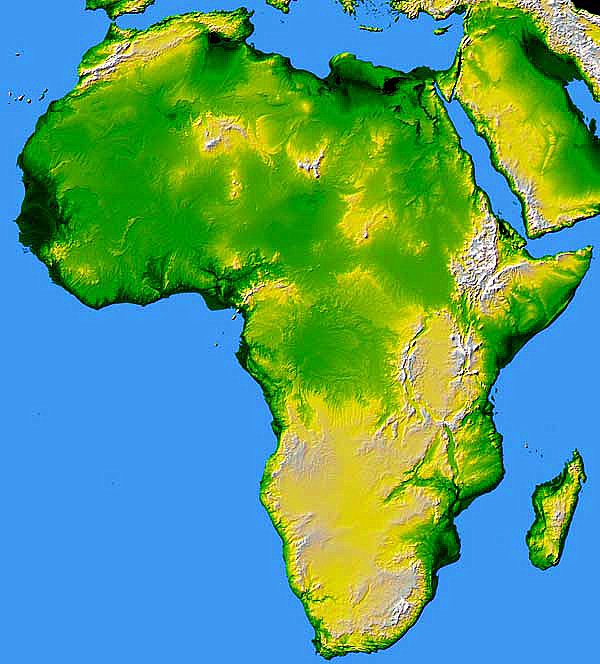|
NASA/JPL/NIMA. “WorldSRTM-noPoles-giant” Online Image. Earth Observatory. 16 May 2005
<http://earthobservatory.nasa.gov/Newsroom/NewImages/Images/PIA03395_lrg.jpg>
Africa
This image was created from a larger Public Domain world map produced from data obtained by NASA's
Shuttle Radar Topography Mission (SRTM). The world map was cropped to Africa
and resized to 600 pixels wide using a trial version of Adobe Photoshop. Using Google's free Picasa2 program,
the color and lighting were then enhanced and finally sharpened to obtain the image above. The original
image can be viewed at the NASA link above.
Africa is fairly definitively the continent upon which our species originated around 135,000BC.
(homo sapiens sapiens, ie humans) Most of the continent lies in the tropical zone characterized by lush
growth and vegetation including deep jungles, though the blistering heat of North Africa is year by year
increasingly being lost to the Sahara desert. The second cradle of civilization, Egypt was united by Narmer
around 3000BC. Egypt survived for 2000 years as a dominant culture until the fall of the New Kingdom in
1070BC, after which it was dominated by invaders from the states forming to its South. Phoenician sea
traders from the Middle East founded the important state of Carthage in 814BC, it is best known as the
empire that fell before Rome circa. 200BC. In 525BC, the Persians conquered Egypt, ending its cultural
continuity and inaugurating centuries of domination by Eurasian invaders.
Around 500BC, the Bantu speaking
peoples of West Africa spread out from their small heartland. They would dominate all of Africa south of
the Congo River by 400AD. Around 700AD Ghana emerged as the first state outside North Africa and began an
intense period of state formation and competition in West Africa. The rise of Islam transformed African
culture. The Muslim Arabs conquered Egypt in 642AD, and traders brought Islam across the Sahara to West
Africa around 1070AD. In the southern half of Africa, Bantu chiefs erected the Great Enclosure in Zimbabwe
around 1200AD, one of the few major stone monuments in the region. State formation here first began around
1500AD, much too late to develop independent from European influence.
Already in 1415AD, Christianity
had once again begun to penetrate Africa as the Portuguese conquest of Ceuta in Morocco marked the
return of European influence. Sadly, Christianity was not the dominant institution that Europeans brought
with them, but slavery. By the 1770s the slave trade had reached its peak, sending millions of native
Africans to the Americas where most died either en route in inhuman conditions or were worked to death in
American fields. European influence became dominant in Africa by the 1800s. In 1895AD, the European nations
carved up Africa among themselves at the Berlin Conference, establishing arbitrary borders that continue
to plague rationale government on the continent to this day. This European empire was short lived, between
1950AD and 2000AD, native African governments reestablished control over almost all countries on the continent.
Southern Africa is far enough south that it reaches out of the tropics into the temperate latitudes.
Europeans and Western Civilization have been moderately successful here, but it has never been well
adapted to the tropical climate. Africa continues to struggle with this difficult legacy. Our ancestral
birthplace is still trying to find its own unique path into the modern world.
|
